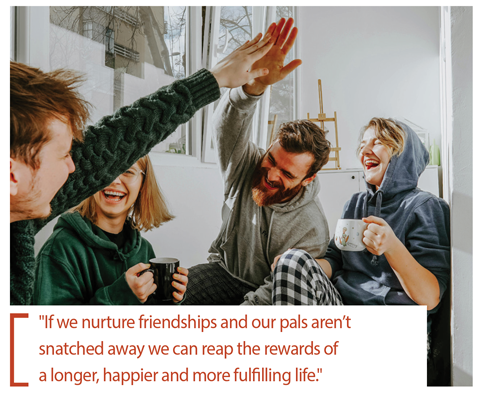Are you familiar with a song by Bette Midler called, “Friends”? It came out in 1972, so if you were born long after bell bottoms were cool (the first time), let me fill you in. The chorus went, “You gotta have… friehhhhhh-ends.” According to the song, Bette had friends, but “somethin’ came and snatched them away.” Yikes. Would love a little back story on that. She sang, “I’ll wait for new friends to come at dawn. I don’t care if I’m hungry or freezin’ cold. I’m gonna get me some of them.” Bette wasn’t playing around when it came to friendship.
Even though she didn’t explain why she was so adamant about making friends, she was right to sing the praises of friendship.
Scientific evidence overwhelmingly supports the notion that humans are inherently social creatures who benefit greatly from having friends. From improved brain health and stress reduction to enhanced emotional well-being and physical health, the positive effects of social connection on our lives are undeniable. If we nurture friendships and our pals aren’t snatched away (poor Bette), we can reap the rewards of a longer, happier and more fulfilling life.
However, making friends as adults is tricky. Gone are the days of bonding over shared classes or playground antics. Now, we’re left to navigate the awkward waters of social interaction armed with nothing but our wits and maybe a few icebreakers. Add in the complexities of adulthood – careers, families, and so many commitments, and it’s no wonder we often feel a little isolated.
The first step in building your adult friend group is recognizing the importance of companionship. Friends aren’t just for giggles and gossip; they’re a crucial support system, helping us navigate life’s ups and downs with a little less stress and a lot more laughter.
So how do you actually go about making friends as a grownup? Well, it’s about finding common ground – quite literally, in some cases. Remember those hobbies you used to love before life got in the way? Dust off that tennis racket, dig out those watercolour paints or lace up those running shoes because joining a club or group centred around your interests is a surefire way to meet like-minded individuals.

Here are a few suggestions to help you seek out those new friends:
1. Pickleball
If you’re looking for a fun and fast-paced way to make new friends, hit your local pickleball court. This hybrid of tennis, badminton and ping pong is all the rage among adults looking to stay active and socialize.
2. Get Out There
Join a local running/hiking/cycling group. Whether you’re a seasoned runner or new to hiking, there’s a group out there waiting to welcome you with open arms (and sweaty high fives).
3. Crafty Crew
Check out a crafting class or workshop in your area. From pottery and woodworking to painting to knitting, there’s bound to be a group of creative souls just waiting to bond over their shared love of all things handmade.
4. Book Lovers
Joining a book club is a fantastic way to meet fellow bookworms and engage in lively discussions about your favourite novels.
5. Cooking
If you take a cooking class, not only will you pick up some new culinary skills, but you’ll also have the opportunity to bond with fellow foodies.
6. Volunteer
Giving back not only feels good, but it’s also a great way to meet new people.
Making friends as a grown-up may not always be easy, but the rewards far outweigh the challenges. So put yourself out there, embrace your interests, and watch as your social circle blossoms before your eyes. After all, you gotta have friends. (Sorry, that sounds bossy. And I’m having trouble with the bad grammar). You don’t “gotta” have friends, but life is sure sweeter when you do.

Studies have shown…
1. Brain health: Social interaction stimulates the brain and may help reduce the risk of cognitive decline as we age.
2. Stress reduction: Spending time with friends can lower levels of cortisol, the body’s primary stress hormone.
3. Emotional well-being: Social support provides a sense of belonging, validation and emotional security, which are essential for maintaining mental health.
4. Physical health: Socially connected people tend to adopt healthier lifestyle habits, such as regular exercise and better nutrition, which contribute to overall longevity.
5. Longevity: Having close friendships provides a sense of purpose, meaning and fulfillment, all of which contribute to a longer and happier life.
LOCAL LINKS – ACTIVITIES AND CLUBS
Crackpot Studios
Adult 10-week pottery sessions
crackpotstudio.com
My Pop Choir
Adult community choir
mypopchoir.com
Pickleheads
Source for pickleball courts across Canada
pickleheads.com
Oakville Public Library
Monthly adult book club
opl.ca
Burloak Canoe Club
Dragon Boat spring sessions
burloakcanoeclub.com
Halton Outdoor Club
Planned outdoor activities
haltonoutdoorclub.ca
The Running Room
Free weekly run club
runningroom.com/ca





